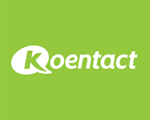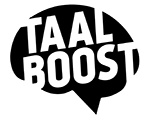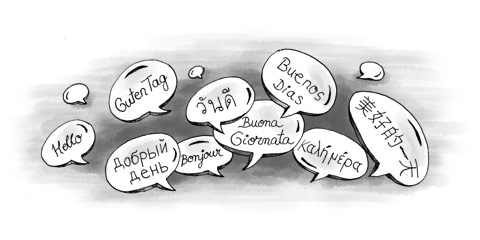Why learn Dutch?
It’s true that in most cities in the Netherlands you will hear many different languages and you can easily get by without speaking Dutch. But, if you're planning on creating a full life and developing a serious career in the Netherlands, you should at least acquire some of the basics of Dutch. If you want to fully embrace the experience of living in the Netherlands, one of the best ways is to understand the mentality behind the way people think and the way things work. Part of that is framed by the language.
Even if you're unsure how long you're going to stay in the Netherlands, remember that there’s at least one good reason to learn Dutch: for yourself! Learning a language keeps the mind agile and expands your horizons. It can be lots of fun and an ongoing project that can be easily incorporated into your day-to-day life.
Take the plunge right away
Why should you get started right away? Because learning another language is a lifelong adventure that will always require taking the first step, so why not start as soon as you’ve moved?
Try ignoring the usual excuses everybody has when learning a new language, like ‘I have no time’, or ‘I’m not good at languages’, or one often used about Dutch: ‘It sounds funny’. For both the short and the long-term, you'll be doing yourself a big disservice if you don't at least give it a try.
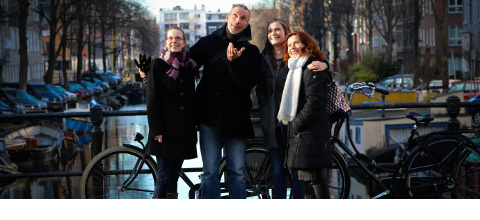
Learn in a way that suits your style
When learning a language, different approaches complement different learning styles. You will probably find that a combination of methods will work for you best. There are countless opportunities for learning Dutch. All Dutch cities have language schools offering various programs with different structures, techniques, and costs.
There are also online courses and social media groups focused on learning Dutch. Radio, television, and film are also very useful, especially watching shows and movies with subtitles in Dutch. Language exchange meet-ups (taalcafés) give you the opportunity to meet native speakers and others who are learning the language. And, of course, there's good old-fashioned print media: course books, newspapers, magazines and flyers. You'll likely wind up using a combination of resources; just find the recipe that suits you.
Practice in everyday life
Perhaps one of the most important tips is to not make learning Dutch an isolated experience. Practice in everyday life. Remember, you live in the Netherlands so you're already in a full-immersion course. If you stay alert to your environment by looking and listening you'll be gaining knowledge all the time. Pay attention to phrases and language that keeps popping up at work or school, in restaurants, the gym and supermarkets. Read the signs! There's visual information all over the place - build on that.
Verder nog iets? Start with small exchanges
Remember that communication is only about 50% language. Much of everyday life includes small exchanges, especially when you’re out and about, so often you already know what’s going on based on the situation. Here are some useful phrases that you may encounter regularly:
- Goedendag - Hello
- Eerst volgende/Wie is er aan de buurt? - Who’s next (in line)?
- Wat mag het zijn? - What would you like?
- Verder nog iets? - Anything else?
- (Wilt u) pinnen? - Would you like to pay by card?
- (Wilt u de) bon mee? - Would you like a receipt?
- Dank u wel - Thank you
- Fijne dag. Tot ziens! - Have a good day. See you!
Expand your horizon
Opportunities to learn Dutch will present themselves on a regular basis, just don't get overwhelmed and don't be too hard on yourself. Small steps will all add up and the skills you accumulate will lead to a confidence and comfort that becomes fluency. And with it, a sense of belonging in the Netherlands.
Bio
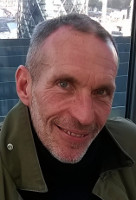
Donald Fleming (New York, 1960) first came to the Netherlands in 1989 to teach at the Amsterdam Academy of Theatre and Dance (AHK). As a dancer and performer, choreographer and teacher he worked extensively in Europe and the Americas. He settled permanently in Amsterdam in 2008, where he now works as a language teacher, life-coach for handicapped teenagers, and gardener.
Donald Fleming has been teaching English at UvA Talen since 2014. UvA Talen is the independent language centre of the University of Amsterdam. Their fast-paced courses in English, Dutch and ten other languages help students make rapid progress.

